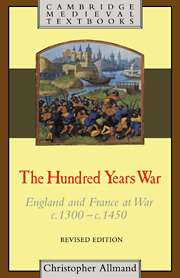Book contents
- Frontmatter
- Contents
- Preface
- List of abbreviations
- Maps
- Genealogy: the succession to the crown of France in the fourteenth and fifteenth centuries
- INTRODUCTION
- 1 THE CAUSES AND PROGRESS OF THE HUNDRED YEARS WAR
- 2 APPROACHES TO WAR
- 3 THE CONDUCT OF WAR
- 4 THE INSTITUTIONS OF WAR
- 5 WAR, SOCIAL MOVEMENT, AND CHANGE
- 6 WAR, PEOPLE, AND NATION
- 7 WAR AND LITERATURE
- CONCLUSION
- Select bibliography
- Index
- Cambridge Medieval Textbooks
CONCLUSION
Published online by Cambridge University Press: 05 June 2012
- Frontmatter
- Contents
- Preface
- List of abbreviations
- Maps
- Genealogy: the succession to the crown of France in the fourteenth and fifteenth centuries
- INTRODUCTION
- 1 THE CAUSES AND PROGRESS OF THE HUNDRED YEARS WAR
- 2 APPROACHES TO WAR
- 3 THE CONDUCT OF WAR
- 4 THE INSTITUTIONS OF WAR
- 5 WAR, SOCIAL MOVEMENT, AND CHANGE
- 6 WAR, PEOPLE, AND NATION
- 7 WAR AND LITERATURE
- CONCLUSION
- Select bibliography
- Index
- Cambridge Medieval Textbooks
Summary
How to conclude? After a long period of war, both England and France had to recover from the ordeal. In England it was the monarchy which was, to all appearances, the loser, its claim to rule France unceremoniously repelled. The contrast with the triumphant years of Edward III and Henry V could not have been greater, as anyone reading the very different accounts of events in London in 1415 and 1450 will quickly recognise. On the second of these occasions betrayal, as well as the bitter sense of defeat, hung heavily in the air. Englishmen who had lived, worked, or fought in Normandy felt let down. Even the pride of those who had never seen France had suffered as the result of recent reversals of fortune, for which Sir John Fastolf, who had left France ten years earlier, had to bear some of the odium of the Kentish rebels who attacked London in July 1450.
Before long, the losses in France would be turned to another purpose, a call to arms in support of the dynastic ambitions of Richard, duke of York, who had twice held high command in Normandy under Henry VI, during which time his eldest son Edward (who would assume the royal mantle in 1461) had been born in Rouen. The link between those who had been with York in France and those who supported him in his quarrel with Henry VI is not, in all cases, clear.
- Type
- Chapter
- Information
- The Hundred Years WarEngland and France at War c.1300–c.1450, pp. 164 - 172Publisher: Cambridge University PressPrint publication year: 1988



